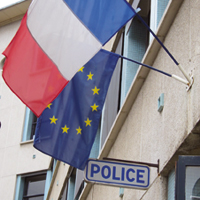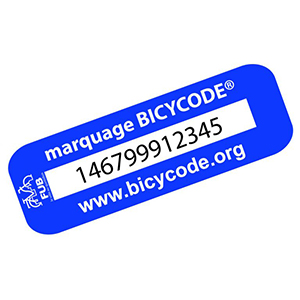 Theft in Paris?! Break in?! Pickpocketed? Emergency?! Bike stolen?!
Theft in Paris?! Break in?! Pickpocketed? Emergency?! Bike stolen?!
Were you the victim of Theft in Paris? Was your apartment or vehicle broken into? Your bag or car stolen? Your home tagged with grafitti? We certainly hope not, but sometimes it is necessary to make a police declaration for theft or damage. The good news is that you can do a pre-declaration online and avoid waiting at the commissariat. Not only will you save time by not having to personally go to the station and wait in line, you can also fill out the form calmly in your own home with a dctionary handy and without pressure to speak French. Once the pre-declaration is transmitted you will be contacted within 24 hours by a police agent who will process the complaint then ask you to stop by to sign (within a month) and finalize the complaint. www.pre-plainte-en-ligne.gouv.fr I can personally vouch for the efficacity of this system. I used it when my bike was stolen. It makes making a complaint quite simple and stress free and thus encourages actually reporting the incident. So many incidents don’t get reported because going to the commissariat used to be as much an ordeal as the incident itself. Reporting the incident, (and if you had the foresight to register your bike – see below – you just might get it back), creates statistics which lead to new measures of protection by revealing problem trends.
Be attentive to not mix up « dépôt de plainte » and « déclaration faite sur main courante« . The main courante (« the running hand » gives nice imagery doesn’t it?) is a register in each police station in which you can make a declaration to signal disturbances without beginning judicial action. It is often used to document conflicts between neighbors or domestic problems. Judicial proceedings can be started by the police if they deem it necessary. A declaration on the main courrant provides a receipt to you so that you can build a case later on if you need to.
In addition for those visitors who do not speak French, S.A.V.E. (Assistance system for foreign victims) is a software application that enables police officers to register a complaint in 16 different languages and to give the victim a receipt in their own language to simplify future administrative steps that may need to be accomplished at an embassy or in the home country.
Theft in Paris Metro
If you are Pickpocketed in the Metro complaints can be filed directly in the station. In the past it was too complicated for tourists to go to the nearest police station to file a formal complaint necessary for insurance reimbursement. The RATP now offers the option to file a complaint in English in all 256 Parisian metro stations. This option is only available for victims of « vols simples ». For more serious claims involving violence or for more than 1000€ in goods you will still need to go to the police station. Hopefully this new option to file in English without leaving the station will increase the number of complaints thus improving the accuracy of the stats on pickpocketing in the Paris metro and maybe, just maybe getting a grip on the problem.
For lost property Visit https://www.
Now test yourself… if your bag is stolen do you know exactly what is in it so that you can itemize the declaration? From vehicle papers, to personal papers, credit cards, Navigo, cinema card, camera, the nice pen Grandma gave you, telephone and more – we carry lots of important items with us that may be covered by insurance if your bag is stolen. Some policies even allow you to claim the cost of getting your papers replaced, but the items must be listed on the plainte.
The Police Department also has a downloadable brochure that shows some of the scams and pitfalls of life and theft in Paris. Have a look here at the things to watch out for. Or check out this set of animated videos by a former police officer that expose some of the scams and frauds that plague the city https://www.youtube.com/c/SafetyScouts
Vacation time
Another great service is Opération tranquilité vacances. A FREE government service where French gendarmes or municipal police pass by during their regular patrols and check on your house or apartment while you’re away. They verify that all looks right and that all the doors and windows are still secure. And they really do do this. Sometimes they leave a note saying they were there. Once we came home a day early and when they saw the house open and a car in the drive they knocked on the door to see what was up. You sign up at least five days before you leave (this can now be done online if you’re in Paris). Download the form and instructions (en français) on their official website: https://www.service-public.fr/particuliers/vosdroits/R41033
BICYCLES
Bikes are stolen way too often. Be sure you lock them up tight with two quality locks. Cable-type locks don’t withstand the test of an equipped thief. U-locks are the best rated and will hold up longer. Add a fixed frame lock to be even better protected. Be sure to lock your bike to something solid and fixed as well using at least 2 locks. Position the lock on your frame – not on the wheel – and try to place it as high up as possible (50cm from the ground) so a thief doesn’t have easy leverage. Many bike racks are not well conceived and only allow you to lock the front wheel to the rack, these are best avoided as they are pretty much useless. Attach and lock your bike inside a hallway, garage or bike room as well. Most bikes are stolen during the day, in busy places and from inside buildings. Thieves use discreet tools or pretend that it is their bike and they have lost the key. See the results of lab tests on bike locks here.
Another thing you can do to fight bike theft (and this will work even better as more and more people do it) is to have your bike registered. For less than 30 euros a bike shop will engrave a BICYCODE number on the frame of your bike, then you register it in the national online database www.bicycode.org. The more bikes registered the less easy they will be to resell and thus fewer will be stolen. Plus about a third of the bikes stolen are abandoned later and if the bike is registered you just might receive a call saying it has been found. In France more than 400,000 bikes are stolen every year! Each year over 150 000 recovered bikes can’t be returned to their owners, due to the lack of traceability. So give your bike a chance to find its way home, register it! Read more https://fusac.fr/bicycle-theft-and-bicycode/
EMERGENCY NUMBER for all of Europe
112 is the Europe-wide emergency number for all services. You can call this number from any telephone, even from a locked mobile phone or one with no sim card.
- You can call 112 from fixed and mobile phones to contact any emergency service: an ambulance, the fire brigade or the police.
- A specially trained operator will answer any 112 call. The operator will either deal with the request directly or transfer the call to the most appropriate emergency service depending on the national organisation of emergency services.
- Operators in many countries can answer the calls not only in their national language, but also in English or French. If the caller does not know where he is, the operator will identify where the person making the call is physically located and will pass it to the emergency authorities so that these can help immediately.
- 112 is also used as the emergency number in many countries outside the EU – such as Switzerland, India and South Africa – and is available worldwide on GSM mobile networks. The number is also automatically transferred to 911 for example in other countries. So remember 112.
Emergency numbers in France:
Police, call 17 To report a crime which requires the immediate intervention of the police (violence, attack, mugging, burglary, etc.) The list of police stations in Paris
Les Pompiers, call 18
The Pompiers do much more than put out fires. These numbers allow you to report a dangerous situation or an accident involving property or people. It allows the emergency brigade to intervene (fire, gas leak, burning, electrocution, traffic accident, etc.)
Other Emergency medical numbers
- SAMU (emergency medical assistance): 15 This emergency service offers a permanent medical hotline to provide the right response for each call: medical advice, private ambulance, general practitioner, etc.
- Emergency number for all services the deaf and hard of hearing: 114



